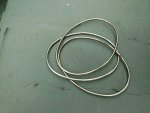Another Ahab
Well-known member
- 18,056
- 4,721
- 113
- Location
- Alexandria, VA
When it looks like nothing to lose, and everything to gain:There are so few things electrical that I would like to remain functional - starter, gauges, work lights front and rear, and the high rpm switch - that I'm willing to take the chance. If something doesn't work afterwards, it'd be easy enough to run new wiring/switches for it.
- The Leap of Faith
Go for it, Brother!









